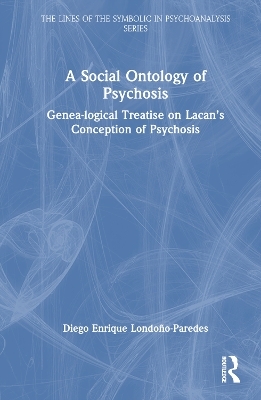
A Social Ontology of Psychosis
Routledge (Verlag)
978-1-032-66357-9 (ISBN)
Londoño proposes a logical framework drawing on the work of Badiou, then traces the historical development of this concept and its implications as a structural necessity for anyone who speaks and engages in discourse. The book opens by exploring set theory, transitioning from nought to one, from the Thing to the object, essential for any presentation. Subsequently, it follows a historical path, examining the evolution of the figure and the signifier of the Father, journeying from ancient Mesopotamian roots through Modernity, touching upon Claudel’s theater and the films of the Coen brothers. Finally, it aligns Searle’s social ontology with Lacan’s discourses, highlighting psychosis as an illustration of being outside discourse, particularly when the Name-of-the-Father is foreclosed. Case material illustrates various ways psychosis manifests without distinct clinical evidence.
This comprehensive book will be of great interest to practitioners and scholars in psychoanalysis, philosophy, the humanities, and the history of mental health and knowledge.
Diego Enrique Londoño-Paredes is a psychoanalyst and clinical psychologist from the Université Rennes 2, France, where he received his doctorate in psychology. He has been a professor in several psychology departments and is currently a member of the psychoanalytic association Analítica and Professor at the Universidad Nacional de Colombia and Universidad Manuela Beltrán.
Part 1: The logical dissertation: the zero symbolic value of the Name-of-the-Father 1. Nought as a non-identical identity and the empty set {ø}: inferring the Thing 2. The inconsistency of the Language set and the divided subject 3. Negation and name: founders of the subject 4. Language, the zero-value signifier, and the signifier of the lack in the Other, S(Ⱥ) 5. Castration and the “extraction of object a”, the offshoots of the Oedipus complex Part 2: A genealogy of The Father and the death of the Father: a quest through jouissance and Modernity 6. The patriarchy and monotheism: an “all”-mighty God 7. God of vengeance and jouissance: a God that is “not-all” 8. Is Modernity a precursor of psychosis? 9. From the conjugal family to the NotF: a look at a misguided conception of the family 10. Depicting the Father in Modernity and Postmodernity: the theatre of Claudel and the cinema of the Coen brothers Part 3: A socio-ontological appraisal of psychosis 11. Declarations and discourse, or the intervention of Language in the founding of eventfulness and the subject-position 12. The outside-discourse of psychosis: a bet on subjectivization and the fundamental fantasy 13. Dealing with psychosis and discourse: a case study
| Erscheinungsdatum | 04.09.2024 |
|---|---|
| Reihe/Serie | The Lines of the Symbolic in Psychoanalysis Series |
| Zusatzinfo | 3 Line drawings, black and white; 3 Illustrations, black and white |
| Verlagsort | London |
| Sprache | englisch |
| Maße | 156 x 234 mm |
| Gewicht | 480 g |
| Themenwelt | Geisteswissenschaften ► Philosophie |
| Geisteswissenschaften ► Psychologie ► Psychoanalyse / Tiefenpsychologie | |
| Medizin / Pharmazie ► Medizinische Fachgebiete ► Psychiatrie / Psychotherapie | |
| ISBN-10 | 1-032-66357-X / 103266357X |
| ISBN-13 | 978-1-032-66357-9 / 9781032663579 |
| Zustand | Neuware |
| Haben Sie eine Frage zum Produkt? |
aus dem Bereich


